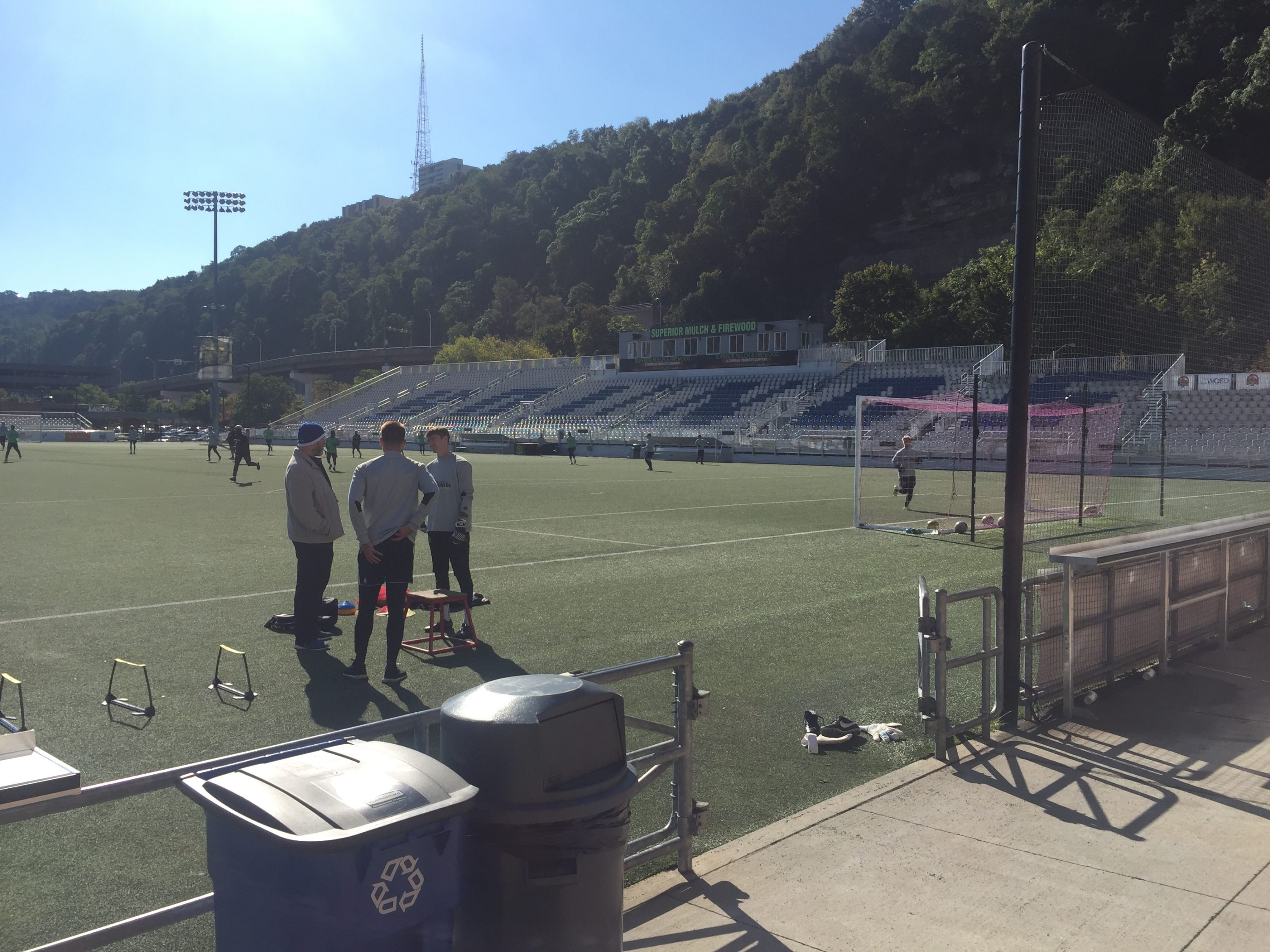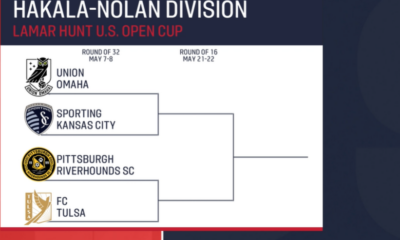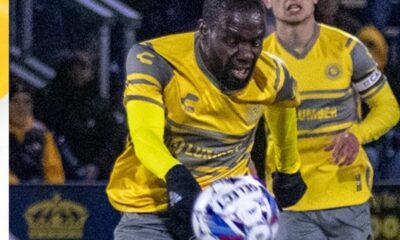
PITTSBURGH — Kenardo Forbes couldn’t help but smile.
Reminded by this reporter that he and coach Bob Lilley have significant shared United Soccer League playoff history together, the 30-year-old Forbes immediately brought up the Rochester Rhinos’ 2015 USL Cup title.
And why not?
Much like he is for this year’s edition of Pittsburgh Riverhounds SC, Forbes was the midfield anchor for those ’15 Rhinos, a season that ended with Forbes assisting on the championship-winning goal.
And, fittingly, if there is a comparison to be drawn between this year’s Hounds and any other team in recent league history, it’s the 2015 Rhinos. They had Lilley, they had Forbes … and they gave up nothing.
Now, the 2018 Hounds didn’t quite match Rochester’s modern (ridiculous) record of 0.44 goals allowed per match — Pittsburgh settled for 0.76 and a league-leading 17 clean sheets — but they laid the foundation for this resurgent season right from the start, giving up zero goals in their first four matches.
The Hounds haven’t been quite as stifling lately, allowing at least one goal in nine of their past 11 outings and multiple goals in six of those. But, if this team has an identity as Saturday’s home playoff game against Bethlehem Steel FC approaches, it’s in front of their goal.
“We defend,” Forbes told me after a breezy 90-minute workout under sunny skies. “We defend as a team. That’s our advantage going into the playoffs. All 11 guys defend. All 11 guys work for each other.”
Doesn’t get much more straightforward than that. A swarming, smothering approach to defending has been a Lilley hallmark for years, and it didn’t change in his first year heading up the Hounds.
But if it’s that simple, a question arises: Did the Hounds simply wear out a bit late in the regular season, when they faced one of the toughest home stretches in the league? After six matches each in August and September, Pittsburgh faced the USL’s top team in Cincinnati, then flew to Atlanta for a midweek matchup, then up to New York to conclude the 34-game slate.
Lilley admitted he saw signs of fatigue, some of which might’ve been attributed to his own demands, on top of matters relating to travel and recovery.
“I didn’t take my foot off the gas for two months, trying to get the two seed,” he said.
Central defender Joe Greenspan had his own thoughts on why the back end got a little leaky at the end.
“In certain matches, we definitely performed better than others,” said the towering second-year Hound. “I think we played well, but there’s room for improvement. On the back end of the schedule we leaked a few more goals than at the beginning of the year. That’s something that we’ve been working on, that we’ve been conscious of.”
With a full week of training at their disposal, the Hounds have been getting back to fundamentals in their own half of the field. Sometimes opponents make plays, but the idea is to hedge one’s bets with sound positioning.
If there’s one area Pittsburgh is addressing before hosting Highmark Stadium’s first playoff game, it’s that.
“It’s tough, because at this point you’re playing tough teams,” Greenspan said. “The level is pretty high. I think when teams do play that positive ball in the attacking third, we’ve got to do our best to limit our mistakes and not give them chances. When they do make the play, we have to be in the right positions to stop them.”
Forbes said something similar, although he was more to the point.
“Try to get on the same page,” he said. “Talk a little bit more and help out the guy next to you.”
As for Lilley, he said he sees his job as to put his team in the best position to win. For all the team’s struggles to score in the first half of the season, the Hounds consistently outshot and out-chanced opponents over the course of the year.
They even started to finish at the back end of the season, netting two or more goals in eight of their final 15 matches. They were blanked only twice over that span, both of which were nil-nil draws.
Their record since the start of August? 6-2-7. Even though they sagged to an 0-1-3 finish, they’ve still been difficult to beat. In fact, that’s held no matter the number of goals each match has contained.
“I’ve been telling people all year: You don’t win by being good offensively or being good defensively,” Lilley said. “You win by being good at both ends of the field and (taking) care of the ball.”
There are those out there who might pigeonhole Lilley (and the Hounds in general) as a defense-first team, but the man with 18 years of experience leading pro teams says something different.
Then again, with memories of a 4-1 September trouncing of Bethlehem still vivid, the Hounds shouldn’t feel like their only path to victory is by grinding out a 1-0 decision.
“We know we want to be aggressive,” Lilley said. “We want to take the game to them. I think if you don’t attack games anytime, it’s not in your best interests, but certainly at playoff time you want to free your players up. So this week is about making sure they know the game plan, making sure they’re fresh when they step on the field Saturday, and then turning them loose.”
Doesn’t sound like a coach trying to get his team to bunker in and hold the fort, if I may mix my stale military metaphors.
At the same time, the 2018 Riverhounds have clearly been better preventing goals than creating them. Against a young Bethlehem squad that features plenty of attack firepower, it stands to reason that building from the back is the primary route to the franchise’s first playoff win since 2004.
“We’re not going to change much, because we’ve been successful all year,” Lilley said. “When you are successful, you want to be as consistent as you can be. We feel like if we’re all on the same page, we can win any game.”















